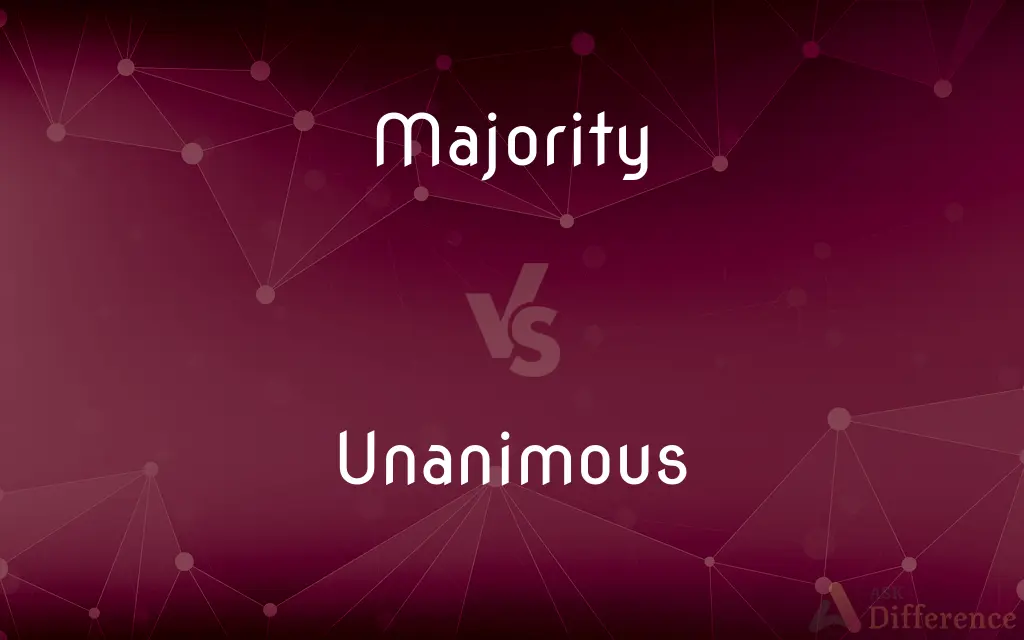Majority vs. Unanimous — What's the Difference?
Edited by Tayyaba Rehman — By Maham Liaqat — Updated on March 12, 2024
Majority refers to more than half of a group agreeing on an issue, while unanimous means all members are in agreement.

Difference Between Majority and Unanimous
Table of Contents
ADVERTISEMENT
Key Differences
Majority involves a scenario where more than half of the participants in a decision-making process agree on a particular issue, which is sufficient to determine the outcome. On the other hand, unanimous decisions require the agreement of every participant, signifying total consensus.
In contexts like voting, majority rule is common, enabling decisions to be made even if there is not complete agreement. Whereas, unanimous decisions are often required in settings where complete accord is crucial, reflecting a collective and absolute agreement.
While a majority decision reflects the preference of the larger part of a group, it may not always account for the views of the minority. Unanimous decisions, however, ensure that every member's opinion is considered and agreed upon, promoting greater unity and satisfaction among participants.
Majority rulings are practical for efficiently making decisions in larger groups, where achieving consensus among all members can be challenging. Unanimity, however, is more common in smaller groups or specific situations where the stakes are high, and complete agreement is necessary for the decision to be implemented.
The concept of majority emphasizes the power of the larger segment of a group to decide, which is a foundational principle of democratic systems. In contrast, unanimity underscores the importance of total agreement and is often used in settings where the impact of decisions is profound and requires full support.
ADVERTISEMENT
Comparison Chart
Definition
More than half agree
All members agree
Common in
Large groups, democracies
Small groups, critical decisions
Reflects
The preference of the larger part
Complete consensus
Decision Efficiency
High, practical for quick decisions
Low, requires more time for consensus
Satisfaction and Unity
May not satisfy all
Ensures everyone's agreement
Compare with Definitions
Majority
A common principle in social and political contexts for efficiency.
Majority rule is a fundamental aspect of democratic societies.
Unanimous
Shows total consensus and unity among members.
The decision to amend the bylaws was unanimous.
Majority
Reflects the preference of the larger part of a group, possibly excluding minority views.
The majority opinion was in favor of changing the company policy.
Unanimous
Required in specific, often critical, decision-making situations.
The committee's approval was unanimous.
Majority
Indicates a decision has been made with substantial, but not complete, agreement.
The board reached a majority decision on the proposal.
Unanimous
Ensures that every member's opinion is considered and valued.
The unanimous agreement reflected the team's solidarity.
Majority
Often used in democratic processes and elections.
The candidate won by a majority vote.
Unanimous
Common in settings where the impact of decisions requires full agreement.
Unanimous consent is often sought in legal and formal resolutions.
Majority
More than half of a group's participants agree on an issue.
The majority of voters supported the new policy.
Unanimous
All members of a group agree on an issue without exception.
The jury reached a unanimous verdict.
Majority
A majority, also called a simple majority to distinguish it from similar terms (see the "Related terms" section below), is the greater part, or more than half, of the total. It is a subset of a set consisting of more than half of the set's elements.
Unanimous
Being of one mind; agreeing in opinion, design, or determination; consentient; not discordant or dissentient; harmonious; as, the assembly was unanimous; the members of the council were unanimous.
Majority
The greater number or part; a number more than half of the total.
Unanimous
Sharing the same opinions or views; being in complete harmony or accord.
Majority
The amount by which the greater number of votes cast, as in an election, exceeds the total number of remaining votes.
Unanimous
Based on or characterized by complete assent or agreement.
Majority
The political party, group, or faction having the most power by virtue of its larger representation or electoral strength.
Unanimous
Based on unanimity, assent or agreement.
The debate went on for hours, but in the end the decision was unanimous.
Majority
The military rank, commission, or office of a major.
Unanimous
Sharing the same views or opinions, and being in harmony or accord.
We were unanimous: the President had to go.
Majority
More than half (50%) of some group.
The majority agreed that the new proposal was the best.
Those opposing the building plans were in the majority, so the building project was canceled.
Unanimous
Formed with unanimity; indicating unanimity; having the agreement and consent of all; agreed upon without the opposition or contradiction of any; as, a unanimous opinion; a unanimous vote.
Majority
The difference between the winning vote and the rest of the votes.
The winner with 53% had a 6% majority over the loser with 47%.
Unanimous
In complete agreement;
A unanimous decision
Majority
(UK) The office held by a member of the armed forces in the rank of major.
On receiving the news of his promotion, Charles Snodgrass said he was delighted to be entering his majority.
Unanimous
Acting together as a single undiversified whole;
A solid voting bloc
Majority
Ancestors; ancestry.
Majority
The quality or condition of being major or greater; superiority.
Majority
The greater number; more than half; as, a majority of mankind; a majority of the votes cast.
Majority
Ancestors; ancestry.
Majority
The amount or number by which one aggregate exceeds all other aggregates with which it is contrasted; especially, the number by which the votes for a successful candidate exceed those for all other candidates; as, he is elected by a majority of five hundred votes. See Plurality.
Majority
The property resulting from being or relating to the greater in number of two parts; the main part;
The majority of his customers prefer it
The bulk of the work is finished
Majority
(elections) more than half of the votes
Majority
The age at which a person is considered competent to manage their own affairs
Common Curiosities
What is a majority decision?
A decision made when more than half of the participants in a group agree on an issue.
When is unanimous decision-making required?
In critical situations or in smaller groups where complete consensus is necessary for the decision's legitimacy.
What does unanimous mean?
When all members of a group are in complete agreement on a decision or issue.
Can a decision be both majority and unanimous?
No, because majority involves more than half but not all, whereas unanimous requires 100% agreement.
Why is majority rule important in democracies?
It allows for efficient decision-making and represents the preference of the larger part of the population.
Are unanimous decisions common in large groups?
No, they are more challenging to achieve in larger groups and are thus less common.
Does a majority decision ensure total satisfaction?
Not always, as it may not account for the views of the minority.
How does a unanimous decision reflect on a group's dynamics?
It indicates strong group cohesion, mutual respect, and the ability to reach agreement on complex issues.
What is the difference between a simple majority and an absolute majority?
A simple majority is more than half of votes cast, whereas an absolute majority refers to more than half of all eligible members, regardless of votes cast.
Can minority opinions influence a unanimous decision?
Yes, since unanimity requires agreement from all members, minority opinions must be addressed and integrated.
How does unanimity affect group unity?
It promotes greater unity and satisfaction, ensuring everyone's opinion is considered.
Is it easier to achieve a majority or unanimous decision?
It's generally easier to achieve a majority decision due to the lower threshold of agreement required.
What role does consensus play in unanimous decisions?
Consensus is at the heart of unanimous decisions, requiring dialogue and compromise to achieve full agreement.
Can a majority vote lead to division within a group?
Yes, especially if the decisions consistently overlook or marginalize the views of a persistent minority.
Why might a group prefer a majority decision-making process?
For efficiency and practicality, especially in larger groups or when quick decisions are necessary.
Share Your Discovery

Previous Comparison
Annoyance vs. Annoyment
Next Comparison
Blow vs. HitAuthor Spotlight
Written by
Maham LiaqatEdited by
Tayyaba RehmanTayyaba Rehman is a distinguished writer, currently serving as a primary contributor to askdifference.com. As a researcher in semantics and etymology, Tayyaba's passion for the complexity of languages and their distinctions has found a perfect home on the platform. Tayyaba delves into the intricacies of language, distinguishing between commonly confused words and phrases, thereby providing clarity for readers worldwide.
















































